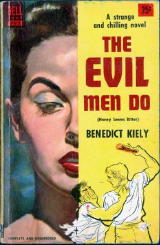Mon 23 Apr 2007
Deaths Noted: BENEDICT KIELY and SARAH KILPATRICK.
Posted by Steve under Authors , Crime Fiction IV , Obituaries / Deaths Noted1 Comment
I’ve been falling behind in terms of pointing out the deaths of a number of mystery authors that Al Hubin has been uncovering recently. Sources that he uses to come up with the dates they died include Contemporary Authors and various sites on the Internet. Eventually the information will appear in the online (and ongoing) Addenda to his Revised Crime Fiction IV, but it’s my intention to post them here on the M*F blog as well, adding to their profiles as I’m able.
There’s such a backlog now that it no longer makes sense to try to do them all at once. If I do only two or three at a time the task won’t seem so overwhelming, and even so, I’d better not put it off any longer.
First in this particular post is Benedict Kiely, born August 15, 1919 in Ireland, author of two titles in CFIV, one marginally crime-related. He died on February 8th earlier this year.
KIELY, BENEDICT (1919-2007)
* -The Cards of the Gambler (Methuen, 1953, hc)
* Honey Seems Bitter (Methuen, 1954, hc) Dutton, 1952. Also published as: The Evil Men Do; Dell, 1954.
Mr. Keily was a Irish journalist, writer and critic, and literary editor of the Irish Press beginning in 1950, overcoming the banning of three early novels, including Honey Seems Bitter. Under Ireland’s censorship laws at the time, the books were deemed to be “in general tendency indecent or obscene.”
Moving to the US in 1964, he was the writer-in-residence and/or visiting professors at three different universities, returning the Ireland in 1968, later receiving the Award for Literature from the Irish Academy of Letters, and was awarded honorary doctorates by the National University of Ireland and the Queen’s University, Belfast.
In 1996 he received the highest honour of Aosdána, the Irish artists’ body, when he was elected a Saoi, in recognition of his contribution to literature, his work displaying both “a deep affection for and exasperation with Ireland.” At the time of his death Benedict Kiely had become one of Ireland’s best-known broadcasters, storytellers and short story writers.
The theme of Honey Seems Bitter is murder and in essence is a psychological study of the dark side of humanity bordering on existentialism. Without seeing the book itself, the blurb for the Dell paperback edition seems shallow in comparison: “Beautiful Lily Morgan had been murdered and defiled, yet even in death she held two men in an unnatural grip.”

Mavis Eileen Underwood, learned to have died in January, 1987, was born 1916 in Guernsey, Channel Islands. She wrote one novel included in CFIV, a Crime Club mystery published under the byline of Sarah Kilpatrick:
KILPATRICK, SARAH; pseudonym of Mavis Eileen Underwood, (1916-1987 )
* Wake All the Dead (Doubleday, 1970, hc) [England] White Lion, 1974.
Again as Sarah Kilpatrick, she wrote a small handful of other books, one of which, Fanny Burney (David & Charles, UK, 1980), was a biography of the 18th century novelist of the same name. The blurb of Ladies’ Close (Gollancz, UK, 1967), one of three works of fiction, compares the novel to the work of Jane Austen except, as one bookseller puts it, “this is more sexual.”
As for Wake All the Dead, it has to do with Rose Tallis, a newcomer to a small English village, a local pub, hippies, an ancient cemetery, drugs, and an old verger’s death.
February 3rd, 2008 at 10:35 pm
Ah, Old Friend, The Country is the poorer for your loss.
“Greater lov’d ye canna be
Will you noo com back gain.”